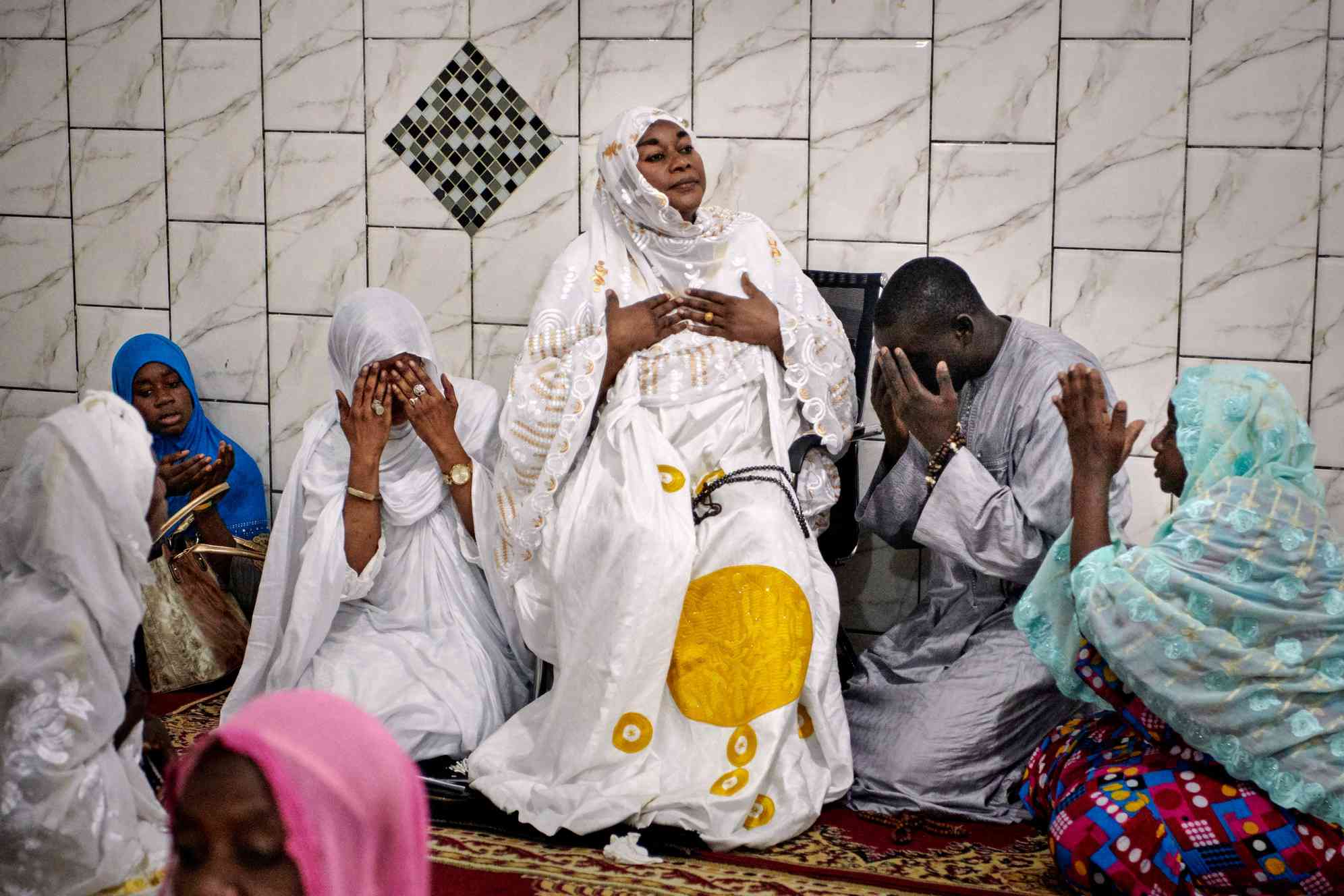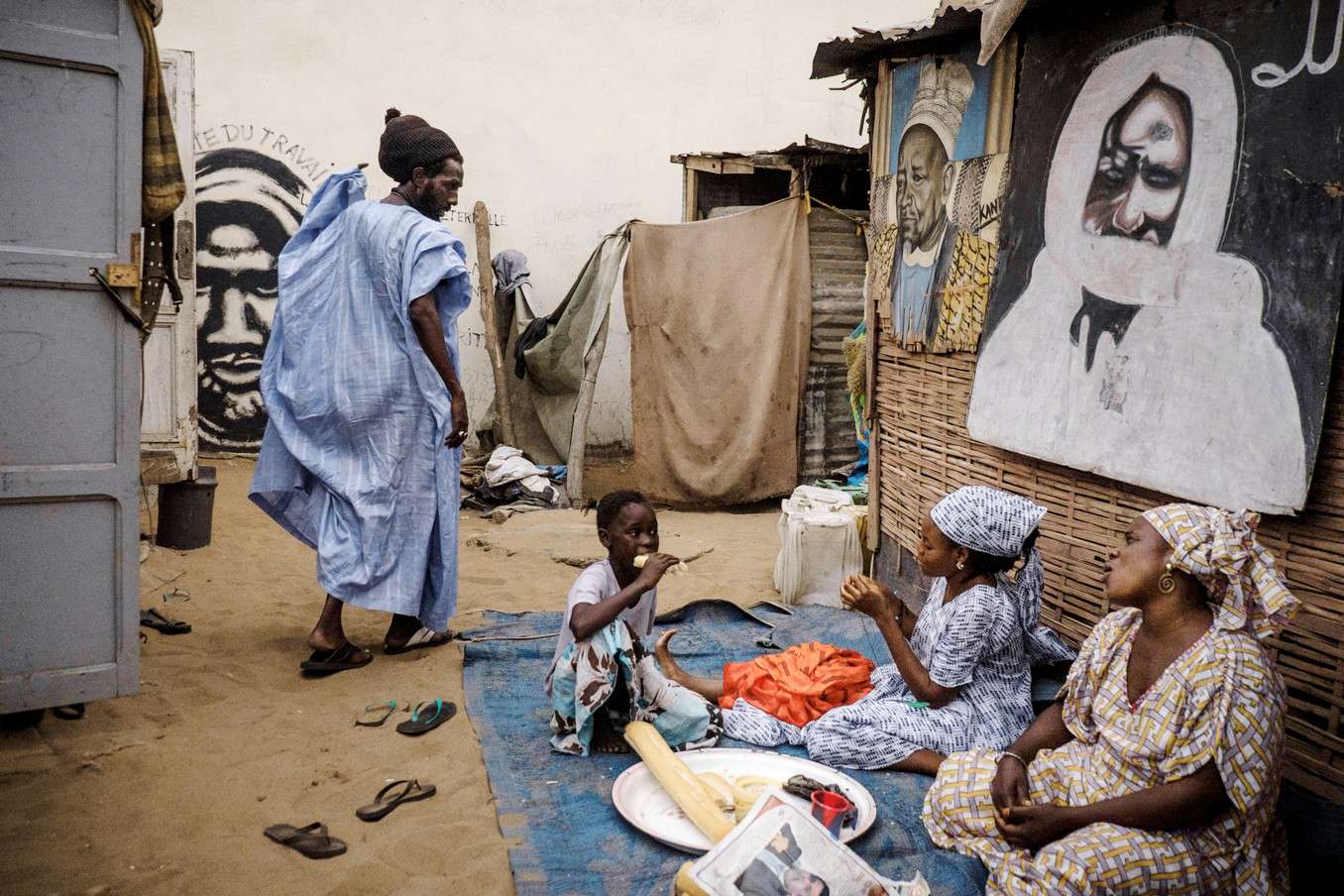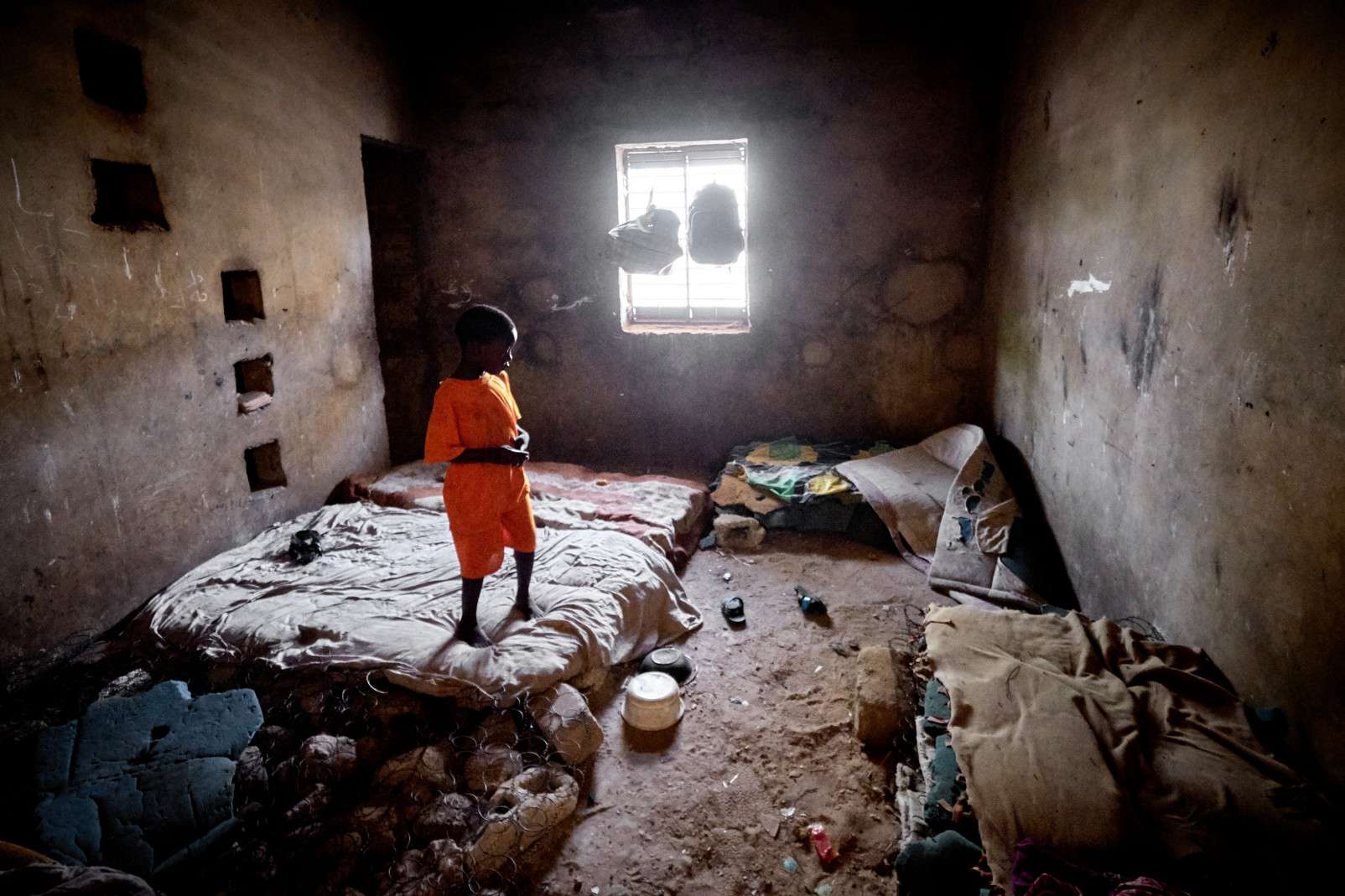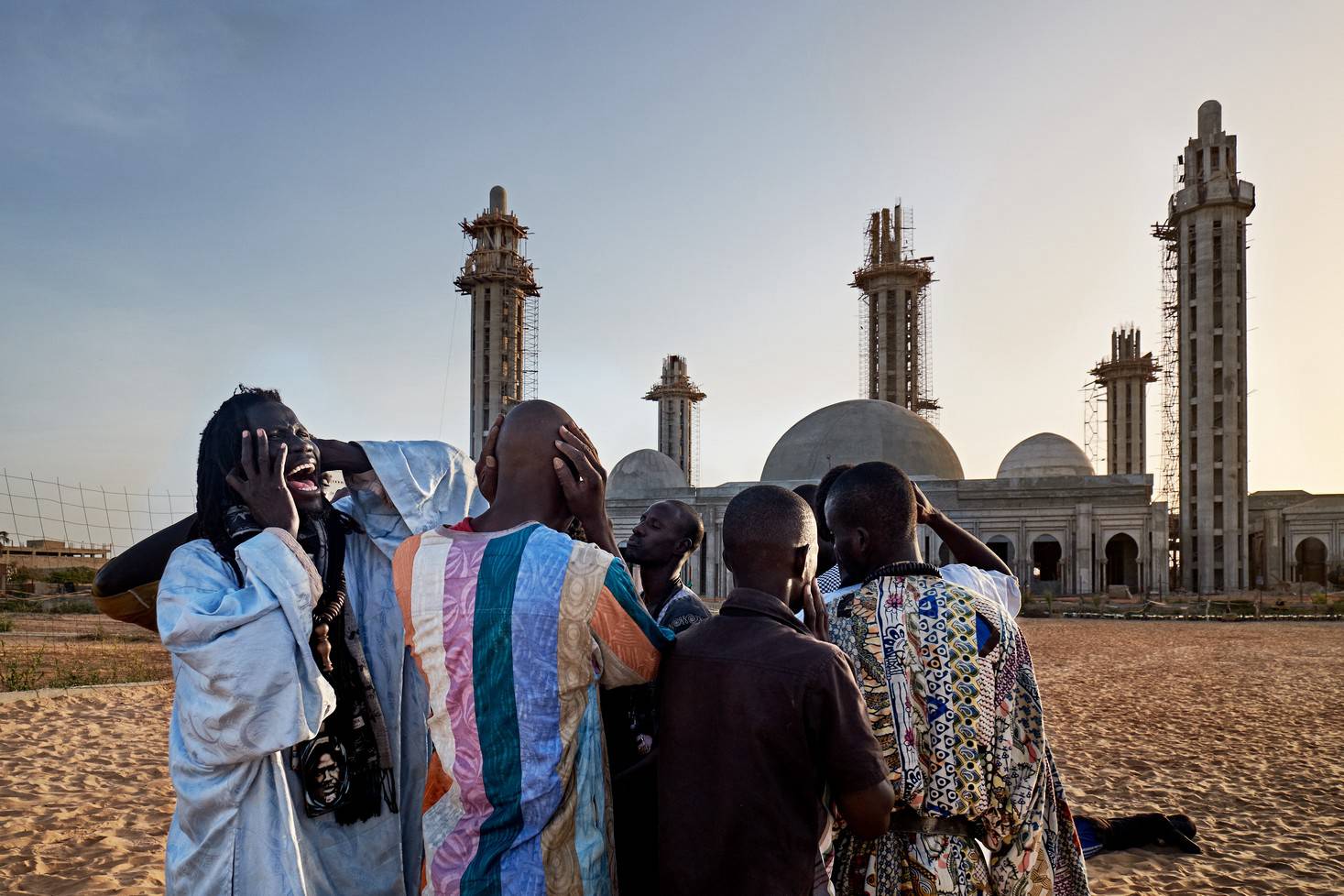Muslim Brotherhoods in Senegal
By Angela Koeckritz
Photos by Christian Bobst
Abridged by Chang Yu Ming (張佑民)
Muslim Brotherhoods in Senegal
By Angela Koeckritz
Photos by Christian Bobst
Abridged by
Chang Yu Ming (張佑民)

Zeyda Moussoukoro Mbaye, a Tijidianidin spiritual guide, listens attentively to her disciples.
The Mighty Muhadam
During the Friday prayer Zeyda Moussoukoro Mbaye sits in the very back. A woman in a white headscarf among the other women. Hidden behind a paravant. Through the wooden slats she can make out the praying men, watching their backs sway up and down. On that side, according to traditional Islamic ideas, is the publicly significant world, the place where decisions are made. While she lives on the silent, hidden side.
But then the prayer is over and the men push towards her. An assistant pushes a chair towards her. Powerful wealthy men kneel before her. One after the other. They soflty take her hand, whisper in her ear. And she listens, giving comfort, advice, and blessing. She is like a mother to him, one of them says later, the company director Ibrahim, 38. "It was fate. Her spiritual depth attracted me, and because she is a woman, I feel more connected to her. More protected. I can tell her things that I would never say to a man."
Meanwhile, Zeyda Moussoukoro Mbaye is the patron of Dahira, the religious association of students of her denomination with more than 600 members. And because many of the students of yesteryear have become chief physicians, politicians and managers, wherever she goes, Mbaye meets "a familiar face." She has become a powerful woman.
Yet she was once far from that.
Zeyda was 14 when her family married her to a distant relative, a stone-rich diamond merchant. He was 26 years older than her, and she was very afraid of him. "He didn't want you to love him, but to fear him."
In total, her husband father fathered 26 children with six wives. More than a third of the married Senegalese live in polygamy. Both Mbaye and her husband are Muslims, but their understanding of Islam could hardly be more different.
He is a Wahabit of Saudi school, of which there are very few in Senegal. She Tijianidin.
Mbaye bore him seven children and raised six more of his ex-wives. She did what he demanded of her. When her mystical dreams became more and more urgent, she decided to let herself be initiated secretly – knowing that her husband was strictly against it.
"When I finally confessed it to him, he went into a rage. He took the furniture out of the house, turned off the water and electricity. For nine years he didn't speak a word to me. But the more he stood up to me, the more determined I became."
Mbaye borrowed a sewing machine, sewed clothes until she had the money to open a studio with six machines. Later she founded six beauty salons, employing 58 people. She practices agriculture and livestock farming, is a member of the chamber of commerce in her hometown of Kaolack, and has founded a transnational network for business women. She got divorced and found a new husband, one she calls a friend.
Mbaye explains her rise with her role as a multiple mother. "I have raised so many children in my life. Even today, friends and relatives still bring me the offspring that they can't cope with. All mothers know something about housekeeping. About money. All mothers are educators. That is why we are ideal religious leaders. We are the source."
Mbaye's case is extraordinary. Most women live differently, religion, tradition and family law assign them a subordinate status. And yet they move more freely, sensually and confidently than in many other Muslim societies. One meets ardent feminists with hijab, working mothers of six children, but also girls who dream of becoming the second wife of a rich businessman. One meets the intellectual in tight dress, strutting into the café in high heels to assure one with a profound knowledge of Islam that the Prophet was in truth a promoter of women. The role of women in Senegalese Islam is complex; in Porokane, for example, there is a mausoleum that a brotherhood dedicated to the mother of its founder. These are the Mourides, the brotherhood that was able to rise to become the most politically and economically influential in Senegal.

On the wall hangs the portrait of Amadou Bamba, founder of the Mouride Brotherhood.
The Marabout with the Rolls-Royce
Visible from afar, the great mosque rises above the city, the second largest in Senegal with a population of three-quarters of a million, to which the state granted autonomy. The magnificent mosque is the largest in sub-Saharan Africa, financed by a massive redistribution from the bottom to the top, from the periphery to the center. Because every Mouride will send a donation to Touba week after week. To increase the glory of the holy city.
Only a few kilometers away from the mosque lives one of whom his followers tell fantastic stories: Serigne Abdou Karim, 54, Marabout. Big landowner. Son of the second caliph, grandson of the founder of the religion Amadou Bamba. By pointing a finger, his disciples say, he can make it rain or lightning.
And doesn't divine grace show itself in his fabulous wealth?
The villa, a dream in white marble. In front of the entrance area four luxury cars are waiting, including a Rolls Royce. Peacocks, wild geese and crown cranes stride through the courtyards, a young antilope leaps past, and in between the royal household wanders. Visitors and followers populate corridors and waiting rooms.
After hours of waiting, Serigne Abdou Karim receives an audience. In the shade of a canopy he is enthroned on an armchair while hundreds of disciples sit at his feet. A scene reminiscent of the ancient kingdoms of West Africa.
Behind him stands one who fans air at him, in front of him stands one who chases away the flies, next to him crouches one who balances silver cans on his knees. Finally a griot, a herald, approaches, who starts to announce the greatness of the marabout. Disciples approach the serigne Abdou Karim on his knees, slipping him money while he praises the value of the work. "It is the greatest treasure. It was she who first made Touba, that nothing in the forest, the second largest city in Senegal!"
That concludes our audience. In a suite worthy of a Saudi prince, a feast of lobster, mussels, quails, chicken, sheep and beef is served. In the hours of waiting, one talks with disciples of the marabout. For example the young chauffeur, who was a criminal and drug addict until he found faith. "The marabout has given me a second life." Education, driver's license, health care. Should he not find a wife to marry, the marabout will introduce him to one, and then he will find them a house.
An all-round carefree package in a country where there is virtually no state social security.
Pah, a clergyman ejects a few hundred kilometers to the west. "They squeeze people out like lemons! Sliding around on their knees before another: That's not true Islam." He had collected enough material to write a book, he says. About how the government grants business licenses to powerful clergymen and the goods they or their middlemen trade with just wave through customs. "They are like a mafia, they have the government in their pockets."
He prefers not to read his real name in the press, as does everyone else who has critical things to say about the coexistence of government and enterprising clergymen. There is the former politician who explains how Mouriden enriched himself with illegal logging and money laundering while the law enforcement agencies looked away in an effort. The scientist who suggests that they encouraged illegal migration. Strong accusations, but they remain completely unproven, since in a country that is often celebrated as a model student of African democracy, there is almost no research on these issues, which many people rumor about. With such work, one scholar concedes, one would make two powerful enemies at once: the brotherhoods and the government.
But it is not only the country's ability to reform that suffers from the lack of public critical debate; the weakest of the weak also suffer: Children.
The Koran School
The city (Mbour) is located on the coast. It is a new quarter, aged before time. A shell of a building is lined up next to it, dreariness, sand and dust, the paths are lined with garbage, a sheep eats through the garbage. Here lies the Daara, the Koran school of the Tijianiyya cleric Ousman Cissé, 42 years old.
No one has bothered to finish the shell of the building. An unfinished first floor, the stairs to the second floor lead straight up to heaven. Bare concrete walls, no electricity, no running water, no furniture, except for the three chairs that Cissé approaches. A few dark rooms are covered with straw and thin mats, with a few dirty mattresses in between. Here 200 children crowd in at night and you can't imagine how they all fit in.

In this tiny room in the Daara, more than 40 children squeeze together to sleep.
Their parents have sent them here to learn the Koran. That's what they are doing right now, standing in an overcrowded classroom; when reciting, they mechanically move their upper bodies back and forth. Their clothes are tattered, some have rashes. Cissé claims they are between 8 and 20 years old, in fact some of them look like five or six.
The parents have paid neither school fees nor housing, says Cissé, so the children have to pay for it themselves. "In the rainy season they work in my fields, in the dry season they go begging. Everyone has to provide their own meals. Whatever they scrounge in addition, they have to hand over to Cissé.
One can see the begging Koran students on many street corners in Senegal, torn down figures collecting their alms in plastic buckets. According to estimates by the organization Human Rights Watch, at least 100,000 of them live throughout the country. There are few good Koran schools where the children learn something for life and do not have to beg. Most of them, however, look like those of Cissé. The children hardly learn arithmetic, writing or the official national language French; many of them will probably one day increase the enormous army of day laborers. Until then, they live far from their parents, exposed to the relentless law of the strongest.
"For an Islamic education, you need a little rigor," says Cissé. In concrete terms, this means that you hit the children with cables if they make mistakes when reciting the verses. And yet Cissé is still a relatively good marabout, social workers assure us that there are much worse ones than him. Those who lock up their children, chain them up, sexually abuse them, chastise them to the point of unconsciousness if they don't beg enough.
Running a Daara can be a fantastic business. Whoever supervises 200 children who beg 200 West African francs a day – and that is usually the minimum a marabout demands from its students – receives 40,000 West African francs a day, the equivalent of 60 euros. In a country where the average income is around three euros a day, this is considered a phenomenal turnover.
"In many families and daaras, children are exploited for economic purposes," says Madame Corumba Ndiaye Ndoye, who takes care of abused children at the city of Mbour. No one knows how many Daaras there are in the country, she says: "Anyone who wants to can open a Daara. There is practically no supervision."
Whenever Ndoye pursues a suspicion of abuse, she encounters the same argument: "It is then said that we are against Islam. The government, too, has so far failed in its attempt to find solutions, due to a lack of concepts and lobbying by the brotherhoods, which demand the greatest possible autonomy for themselves.
Light and shadow, they are sometimes close together.
The great freedoms, the unregulated spaces that the state grants to the fraternities, thwart important reforms that hinder the country's progress. For example, in a state where people rely on family and brotherhoods for their social security, only a few taxes are collected. Consequently, the state has no money to build a social system.
At the same time, the fraternities provide stability and social cohesion. They mediate between tradition and modernity, offer economic networks and social security. They preach peace and tolerance.

Followers sing their prayers in front of a mosque that is still under construction.
Contact Us | Plan a Visit | Donate
8 Lide Road, Beitou 11259, Taipei, Taiwan
886-2-2898-9999
005741@daaitv.com
©Tzu Chi Culture and Communication Foundation
All rights reserved.
